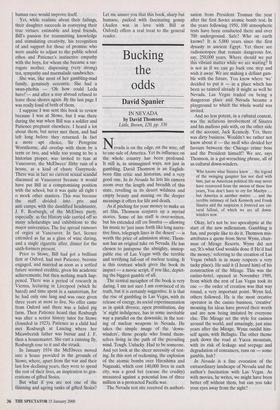Bucking the odds
David Spanier
IN NEVADA by David Thomson Little, Brown, £20, pp. 330 evada is on the edge, on the wire, off to one side of America. Yet its influence on the whole country has been profound. It still is, in unimagined ways, not just in gambling. David Thomson is an English- born film critic and historian, and a very good one. In In Nevada he lets his camera zoom over the length and breadth of this state, revelling in its desert wildness and empty beauty and musing on the deeper meanings it offers for life and death.
As if pitching for your money to make an art film, Thomson conjures up a myriad stories. Some of his stuff is over-written, but his extended riff on Sinatra — allowing his music to 'just issue forth like long narra- tive lines, telegraph lines in the desert' — is worth the price of admission alone. Thom- son has an original take on Nevada. He has chosen to juxtapose the almighty, unstop- pable rise of Las Vegas with the terrible and terrifying fall-out of nuclear testing. It is this contrast which gives the book its impact — a movie script, if you like, depict- ing the biggest gamble of all.
The central metaphor of the book is very daring. I am not sure I am convinced of its truth, but it is certainly suggestive. It is that the rise of gambling in Las Vegas, with its release of energy, its social experimentation as in quick divorce, open prostitution, day 'n' night indulgence, has in some inevitable way a parallel on the downside, in the test- ing of nuclear weapons in Nevada. He takes the simple image of the 'down- winders', those people who found them- selves living in the• path of the prevailing wind. Tough. Unlucky, Had to be someone. And yet look at the sheer necessity of test- ing. In this sort of reckoning, the explosion of the atomic bombs over Hiroshima and Nagasaki, which cost 140,000 lives in each city, was a good bet (excuse the crudity) measured against a potential loss of three million in a protracted Pacific war.
The Nevada test site received its authori- sation from President Truman the year after the first Soviet atomic bomb test. In the years following 1950, 100 atmospheric tests have been conducted there and over 700 underground. Safe? Who on earth knows? It is 5,000 years since the first dynasty in ancient Egypt. Yet there are radioisotopes that remain dangerous for, say, 250,000 years. Where should we put this vibrant matter while we are waiting? It is not as if we can go back one step and wish it away. We are making a defiant gam- ble with the future. You know where 'we' decided to put it — in a place which has been so tainted already it might as well be Nevada. Las Vegas traded on being a dangerous place and Nevada became a playground to which the whole world was invited.
And no less potent, in a cultural context, was the nefarious involvement of Sinatra and his mafioso pals with, on the other side of the account, Jack Kennedy. Yes, there was dirty business. Wouldn't we rather not know about it — the moll who divided her favours between the Chicago crime boss and the President himself? We are, says Thomson, in a gut-wrenching phrase, all of us cultural down-winders.
Who knows what Sinatra knew ... the legend of the swinging gangster has not died with him, just as American political life may never have recovered from the swoon of those few years, You don't have to cry for Marilyn ... but America is another matter ... and the terrible intimacy of Jack Kennedy and Frank Sinatra and the suspicion it fostered are cul- tural fallout, of which we are all down- winders now.
Okay, let's not be too apocalyptic at the start of the new millennium. Gambling is fun, and people like to do it. Thomson mis- attributes a quote from Steve Wynn, chair- man of Mirage Resorts. Wynn did not say,'It's what God woulda done if He'd had the money,' referring to the creation of Las Vegas (which is in many respects a very tacky place). He said it (I heard him) of his construction of the Mirage. This was the casino-hotel, opened in November 1989, from which the rest of Las Vegas took its cue — the order of creation was that way round, a very important point. Wynn led, others followed. He is the most creative operator in the casino business, 'creative' meaning his ideas have proved their worth and are now being imitated by everyone else. The Mirage set the style for casinos around the world, and amazingly, just nine years after the Mirage, Wynn outdid him- self again, with Bellagio. The other theme park down the road at Yucca mountain, with its risk of leakage and seepage and degradation of containers, runs on — some gamble, huh?
In Nevada is a fine evocation of the extraordinary landscape of Nevada and the author's fascination with Las Vegas. As with movies, he writes, we might have been better off without them, but can you take your eyes away from the sight?


























































 Previous page
Previous page